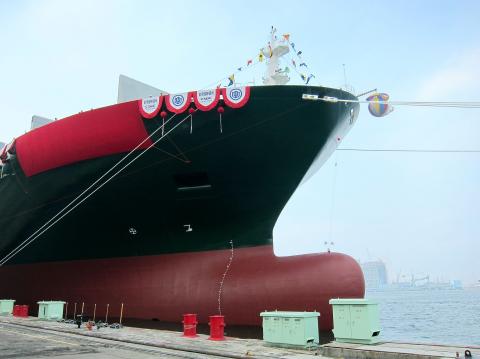As the rates for freight routes between East Asia and Europe continue rising amid a strong seasonal demand, Evergreen Marine Corp (長榮海運) yesterday said it aimed to return to profitable operations for the quarter.
The container shipping company, part of the Evergreen Group (長榮集團), said that freight rates have trended upward over the past few months.
The upturn in prices for routes between East Asia and Europe has been high enough for the company to make profits.

Photo: Chang Chia-ming, Taipei Times
“The sentiment of the container shipping sector is in line with my expectations that it would continue to move in a positive direction,” group vice chairman Bronson Hsieh (謝志堅) told a media briefing, before accepting delivery of an L-type vessel with capacity of 8,508 twenty-foot equivalent units (TEUs) — christened Ever Loading (長盛輪) — from the nation’s only shipbuilder, CSBC Corp, Taiwan (台灣國際造船).
Last month, Hsieh said he was upbeat about the sector, because he could almost see “the light at the end of the tunnel.”
The July-to-September quarter is traditionally a peak period for container shipments due to strong seasonal demand.
Based on the latest data offered by market researchers, routes to Europe and the US may see a further increase in rates next month, in line with Hsieh’s optimistic view.
Evergreen Marine has yet to release its earnings report for the second quarter.
The nation’s largest container shipment company reported a NT$1.69 billion (US$56.24 million) net loss in the first quarter.
The recovery in the global economy has had a positive impact on global exports and therefore leading to a higher volume of container shipments.
Evergreen Marine said it is ready to welcome more vessels to expand its fleet, to reflect the projected increase in demand.
The container ship of which Evergreen Group took delivery yesterday is the sixth of 10 container ships it ordered in May 2011 and the group’s 26th L-type vessel, with the remaining four vessels scheduled to be delivered by the third quarter of next year.
Compared with the previous 8,500-TEU vessel design, the new type of container ship is able to help Evergreen Group cut fuel costs by 20 to 30 percent, Hsieh said.
The group is to make use of these 8,508-TEU container ships, which cost around US$100 million per vessel, to launch a new service between Asia and the East Coast of the US via the Suez Canal.
Evergreen Group commenced its latest fleet renewal program in 2010, with the company scheduled to take delivery of a total of 55 new ships above 8,000 TEUs between 2012 and 2017.

SEEKING CLARITY: Washington should not adopt measures that create uncertainties for ‘existing semiconductor investments,’ TSMC said referring to its US$165 billion in the US Taiwan Semiconductor Manufacturing Co (TSMC, 台積電) told the US that any future tariffs on Taiwanese semiconductors could reduce demand for chips and derail its pledge to increase its investment in Arizona. “New import restrictions could jeopardize current US leadership in the competitive technology industry and create uncertainties for many committed semiconductor capital projects in the US, including TSMC Arizona’s significant investment plan in Phoenix,” the chipmaker wrote in a letter to the US Department of Commerce. TSMC issued the warning in response to a solicitation for comments by the department on a possible tariff on semiconductor imports by US President Donald Trump’s

‘FAILED EXPORT CONTROLS’: Jensen Huang said that Washington should maximize the speed of AI diffusion, because not doing so would give competitors an advantage Nvidia Corp cofounder and chief executive officer Jensen Huang (黃仁勳) yesterday criticized the US government’s restrictions on exports of artificial intelligence (AI) chips to China, saying that the policy was a failure and would only spur China to accelerate AI development. The export controls gave China the spirit, motivation and government support to accelerate AI development, Huang told reporters at the Computex trade show in Taipei. The competition in China is already intense, given its strong software capabilities, extensive technology ecosystems and work efficiency, he said. “All in all, the export controls were a failure. The facts would suggest it,” he said. “The US

The government has launched a three-pronged strategy to attract local and international talent, aiming to position Taiwan as a new global hub following Nvidia Corp’s announcement that it has chosen Taipei as the site of its Taiwan headquarters. Nvidia cofounder and CEO Jensen Huang (黃仁勳) on Monday last week announced during his keynote speech at the Computex trade show in Taipei that the Nvidia Constellation, the company’s planned Taiwan headquarters, would be located in the Beitou-Shilin Technology Park (北投士林科技園區) in Taipei. Huang’s decision to establish a base in Taiwan is “primarily due to Taiwan’s talent pool and its strength in the semiconductor

French President Emmanuel Macron has expressed gratitude to Hon Hai Precision Industry Co (鴻海精密) for its plan to invest approximately 250 million euros (US$278 million) in a joint venture in France focused on the semiconductor and space industries. On his official X account on Tuesday, Macron thanked Hon Hai, also known globally as Foxconn Technology Group (富士康科技集團), for its investment projects announced at Choose France, a flagship economic summit held on Monday to attract foreign investment. In the post, Macron included a GIF displaying the national flag of the Republic of China (Taiwan), as he did for other foreign investors, including China-based